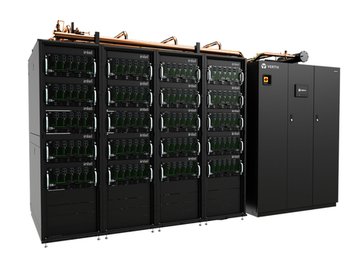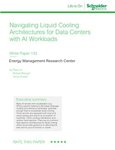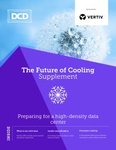Intel's Gaudi3 AI accelerator, due to arrive in 2024, will have two-phase liquid cooling developed in partnership with Vertiv.
The systems will have a pumped two-phase (P2P) cooling system designed to remove up to 160kW of heat, using water from 17°C up to 45°C (62.6°F to 113°F). An alternative for air-cooled data centers up to 35°C (95°F) will work up to 40kW of heat load.
Vertiv has declined to say whether the systems will use PFAS "forever chemicals" (see below). The possible health risks of PFAS have caused issues for other two-phase cooling products.
Vertiv says the medium pressure direct P2P refrigerant-based cooling solution will help customers implement heat reuse, and use free air cooling in their data centers while reducing power usage effectiveness (PUE), and water usage effectiveness (WUE) figures.
Intel's Gaudi processors are designed for AI training, and are being pitched as the "clear alternative" to market-leading Nvidia. They are produced by Habana Labs, which Intel purchased in 2019 for $2 billion. The Gaudi2 processor was launched in 2022, and is being used in an AI supercomputer which Intel is building for Stability AI. The chips are made by TSMC.
The power demands of AI are growing as rapidly as Bitcoin before it. The sector is predicted to consume as much electrical energy as the Netherlands by 2027. That power consumption is causing concern over net-zero targets, but more practically, all the energy turns to heat, which creates the practical issue of removing the heat from servers and data centers, leading to the adoption of liquid cooling.
Two-phase liquid cooling removes heat more effectively than other liquid cooling techniques because it allows the coolant fluid to boil while in contact with the hot electronics. The technique has hit a snag recently, as all current two-phase cooling systems use PFAS (poly-fluoroalkyl substances). These are considered a "forever chemical" and have been labeled as a health risk. The leading product, 3M's Novec, is being canceled, and two-phase players such as Zutacore and LiquidStack are exploring alternatives.
Update: An earlier version of this story contained a statement from Vertiv saying the company would not use PFAS substances.
Following requests for clarification, Vertiv has withdrawn that statement, but declined to say what coolant it will use.
The company says it will use "low GWP engineered fluids that are compliant with applicable EU regulations," adding that it "continues to research and evaluate innovative technologies to support customer demand and enable customer sustainability objectives."






